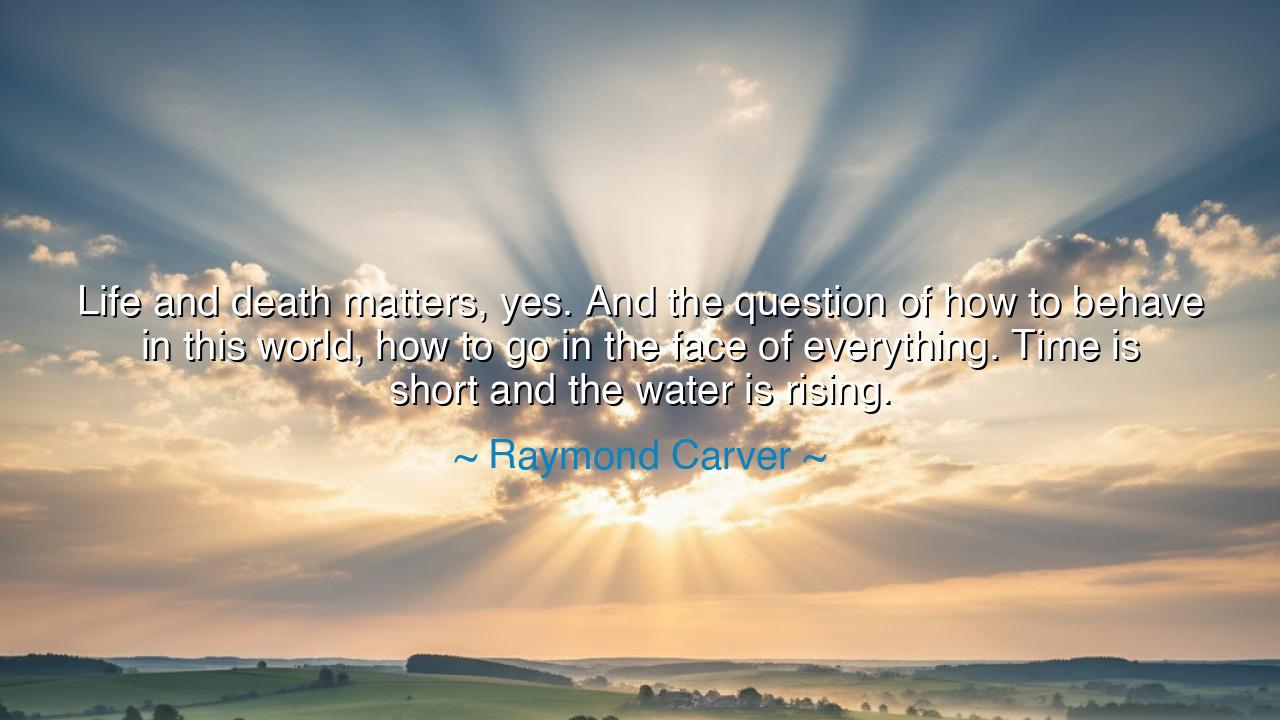
Life and death matters, yes. And the question of how to behave in
Life and death matters, yes. And the question of how to behave in this world, how to go in the face of everything. Time is short and the water is rising.






Raymond Carver once wrote: “Life and death matters, yes. And the question of how to behave in this world, how to go in the face of everything. Time is short and the water is rising.” These words, drawn from the depths of his hard-lived wisdom, are not the lament of a man defeated by mortality, but the awakening cry of one who has looked death in the eye and found clarity. Carver, whose own life was marked by struggle, redemption, and the quiet triumph of self-awareness, gives voice here to the ancient and eternal truth — that life is brief, death inevitable, and what truly defines us is how we live between the two.
The origin of this quote rests in the final years of Carver’s life, when he had overcome years of addiction, despair, and brokenness. Having found love and peace at last, he stood face to face with his own mortality — lung cancer would soon take him — and yet, he did not speak of regret, but of urgency. “The water is rising,” he says, a metaphor both poetic and prophetic. It is the image of time rushing upon us, the flood of life that spares no one. The sea of mortality rises steadily at our feet, and we must choose how to stand — with fear, or with grace and purpose. In that rising water lies the test of all human souls: not how long we live, but how deeply, how honestly, and how lovingly we live before the tide carries us away.
When Carver speaks of “how to behave in this world”, he echoes the oldest question known to humankind — the same question pondered by sages, poets, and prophets since time began. It is not enough to live; one must live well. Not enough to exist; one must exist with conscience. The ancients would have understood him, for they too saw life as a brief flame in the dark, demanding reverence and meaning. The Stoic philosopher Marcus Aurelius wrote, “You could leave life right now. Let that determine what you do and say and think.” In both men’s words, across the gulf of centuries, we hear the same truth: that awareness of death is not despair, but instruction. It teaches us to act with urgency, to speak with kindness, to strip away the trivial, and to live with integrity before the flood rises higher.
To understand the spirit of Carver’s wisdom, consider the story of Ernest Shackleton, the Antarctic explorer who led his crew through one of the most harrowing survival stories in human history. When their ship, Endurance, was crushed by ice, death seemed certain. Yet Shackleton refused to surrender to despair. He kept his men alive through leadership, courage, and relentless hope. In the face of the rising water — both literal and symbolic — he chose not fear, but behavior rooted in purpose. He behaved as Carver might have urged: with strength, compassion, and dignity amid chaos. The ice and sea became his test, just as time and mortality are ours.
Carver’s phrase “the water is rising” also speaks to the inner storms that threaten to overwhelm the human heart — the mounting pressures, losses, and fears that come with every passing year. The water rises when we lose someone we love, when the world changes faster than we can bear, when age steals our youth, and the future becomes uncertain. Yet, even as the flood rises, Carver reminds us: there remains a choice — how to go in the face of everything. Shall we surrender to fear, bitterness, and apathy? Or shall we, like the steadfast oak, stand tall against the tide, living with gentleness, truth, and love until the very end?
This quote, then, is not one of despair, but of defiant wisdom. Carver is calling us to awareness — to see clearly the preciousness of our days, the weight of our actions, and the brevity of our journey. Life and death are not opposites but companions, walking beside us from the first breath to the last. The rising water does not seek to destroy us, but to remind us that every moment counts. To live well is to accept mortality without surrendering to it — to let the nearness of death sharpen our gratitude for life.
So take this as the lesson: time is short — do not waste it. Speak the truth while you can. Love without hesitation. Forgive quickly. Be brave in your choices, for hesitation is the thief of meaning. When the waters of hardship rise, do not curse the flood; learn to walk through it with faith. When your time comes — as it must for us all — may you look back, not with fear, but with peace, knowing that you lived with courage and heart.
For Raymond Carver’s words are not merely about life and death, but about the sacred art of living consciously. “The water is rising,” he warns, but that is no reason to despair — it is the reason to live more fiercely, more kindly, more truthfully. Between the first cry of birth and the last breath of death, there lies this one divine opportunity: to choose how to stand in the flood. And the one who stands with grace — even as the water rises — has already touched eternity.






AAdministratorAdministrator
Welcome, honored guests. Please leave a comment, we will respond soon